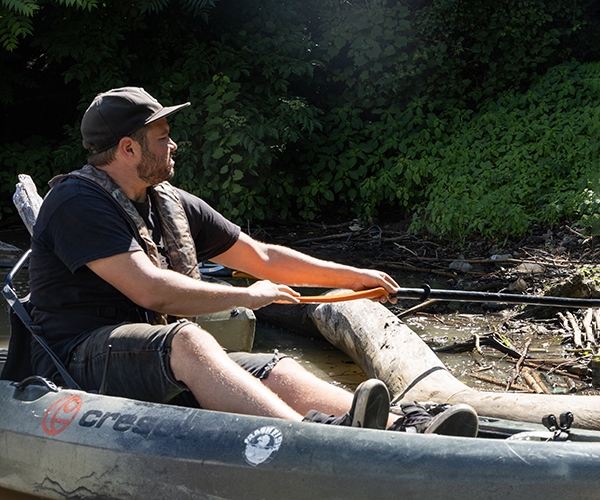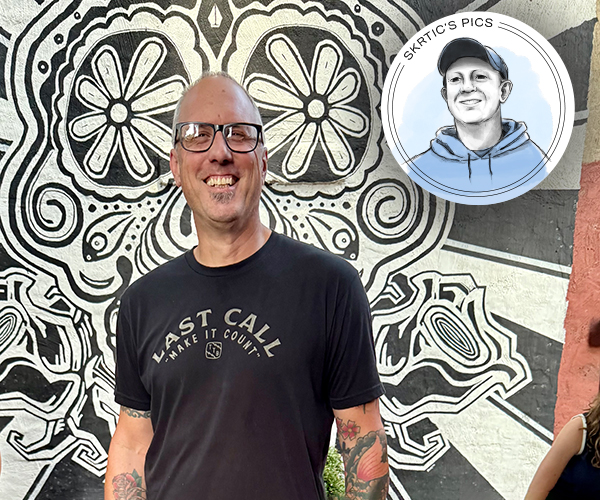Mark Lyons may be a farmer and a fisherman, but you won't find him spending his days out in the sunshine working the land or casting a line. Instead he's toiling away in a dark, sprawling 5,200-square-foot warehouse on East 34th Street amid a maze of PVC pipes and humming motors tending to five bubbling tanks, each filled with 2,000 Nile tilapia.
As the founder of Cleveland Urban Aquaculture, the former biology teacher nurtures the freshwater fish from hatchling to harvest like an attentive dad. He scoops up a net full of the glistening and thrashing animals from their 4,000-gallon home and beams like any proud parent.
"I love all things fish — I have been raising them almost my whole life and studied them in college," says the 30-year-old entrepreneur, who sells his tilapia to area restaurants, caterers and markets. "I've always wanted to do something that could help mitigate the overfishing problems our oceans face and contribute to society. This idea has been at the back of my mind for a long time."
Lyons decided to move forward with his plan in 2011 when his full-time job at University School looked like it was turning into a part-time gig. He started in the basement of his Maple Heights home, expanded into the backyard and a year later decided to quit teaching completely and sink his life savings and almost all his waking hours into this venture.
"I banked my extra money for years and then I spent it all in one week, buying used equipment and moving it from Pennsylvania," he says. It took eight trips back and forth with a 20-foot flatbed.
The timing couldn't have been better. Concerns continue to mount about depleting fish stocks as more than 170 billion pounds of fish and shellfish are caught anually in the world's oceans.
In addition, people want to know what they're eating and where it comes from. But Lyons admits there's a prejudice among some chefs against any farmed fish because conditions at most commercial operations are awful. He's working to change that perception.
"I feed them a high-quality plant-based diet, keep things meticulously clean and carefully control every aspect of their environment," he explains.
It requires seven to eight months for fingerlings — a young fish — to reach optimum size. "Tilapia are the oldest cultured fish in recorded history," he explains. "They grow quickly and have a slightly sweet, mild flavor when they reach the right moment of maturity."
Lyons' prices are competitive, just a bit more than the cost of the same product from South America. He delivers approximately 200 pounds a week to three downtown Asian restaurants, carting them there live in the back of his pickup truck.
Toast, a new wine bar in the Gordon Square Arts District, smoked 50 pounds for its first friends and family event. Kate's Fish at the West Side Market is also a customer, displaying them on ice with a sign that proclaims their freshness: "These were swimming at 8 a.m. today."
Lyons describes himself as a born tinkerer who likes a challenge. When heaters or filters break, it's his job to fix them. He did all the plumbing and electrical work to set up the recirculating aquaculture system, which conserves water and captures waste. That waste is also a great natural fertilizer, and he's using it for a secondary commercial venture — growing lettuce indoors on rafts that float in beds irrigated with fish water.
He's building out his space on East 65th Street and Euclid Avenue and has dreams of moving the fish operation into an even bigger facility where he can also raise shrimp and barramundi, noting that businesses like his could make it unnecessary to import farmed fish from other countries.
"I worked in restaurants while in college and cook a lot at home, so I understand the importance of starting with the best ingredients," he says. "I like the idea that I'm earning a living — or trying to — providing good food to my community."



